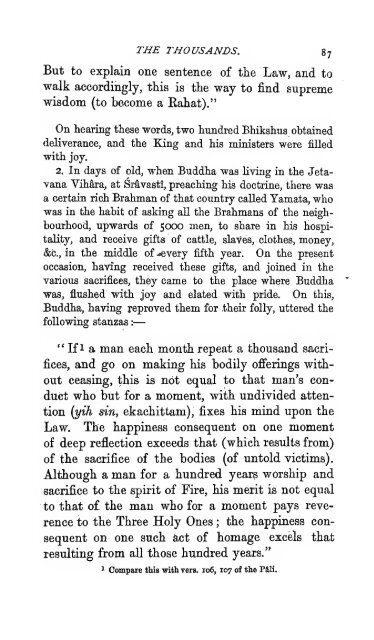Texts from the Buddhist canon : commonly known as Dhammapada
Texts from the Buddhist canon : commonly known as Dhammapada
Texts from the Buddhist canon : commonly known as Dhammapada
You also want an ePaper? Increase the reach of your titles
YUMPU automatically turns print PDFs into web optimized ePapers that Google loves.
THE THOUSANDS. 87<br />
But to explain one sentence of tlie Law, and to<br />
walk accordingly, this is <strong>the</strong> way to find supreme<br />
wisdom (to become a Eahat)."<br />
On hearing <strong>the</strong>se words, two hundred BMkshus obtained<br />
deliverance, and <strong>the</strong> King and his ministers were filled<br />
with joy.<br />
2. In days of old, when Buddha w<strong>as</strong> hving in <strong>the</strong> Jetavana<br />
Vihira, at SrS,v<strong>as</strong>ti, preaching his doctrine, <strong>the</strong>re w<strong>as</strong><br />
a certain rich Brahman of that country called Yamata, -who<br />
w<strong>as</strong> in <strong>the</strong> habit of <strong>as</strong>kiug aU <strong>the</strong> Brahmans of <strong>the</strong> neigh-<br />
bourhood, upwards of 5000 men, to share in his hospitality,<br />
and receive gifts of cattle, slaves, clo<strong>the</strong>s, money,<br />
&6., in <strong>the</strong> middle of ^very fifth year. On <strong>the</strong> present<br />
occ<strong>as</strong>ion, having received <strong>the</strong>se gifts, and joined in <strong>the</strong><br />
various sacrifices, <strong>the</strong>y came to <strong>the</strong> place where Buddlia<br />
w<strong>as</strong>, flushed with joy and elated with pride. On this,<br />
Buddha, having reproved <strong>the</strong>m for .<strong>the</strong>ir folly, uttered <strong>the</strong><br />
following stanz<strong>as</strong> :<br />
—<br />
" If 1 a man each month repeat a thousand sacri-<br />
fices, and go on making his bodily ofi"erings with-<br />
out ce<strong>as</strong>ing, this is not equal to that man's con-<br />
duct who but for a moment, with undivided atten-<br />
tion {yih, sin, ekachittam), fixes his mind upon <strong>the</strong><br />
Law. The happiness consequent on one moment<br />
of deep reflection exceeds that (which results <strong>from</strong>)<br />
of <strong>the</strong> sacrifice of <strong>the</strong> bodies (of untold victims).<br />
Although a man for a hundred years worship and<br />
sacrifice to <strong>the</strong> spirit of Fire, his merit is not equal<br />
to that of <strong>the</strong> man who for a moment pays reve-<br />
rence to <strong>the</strong> Three Holy Ones ; <strong>the</strong> happiness con-<br />
sequent on one such act of homage excels that<br />
resulting <strong>from</strong> all those hundred years."<br />
1 Compare this with vers. 106, 107 of <strong>the</strong> P41i.





